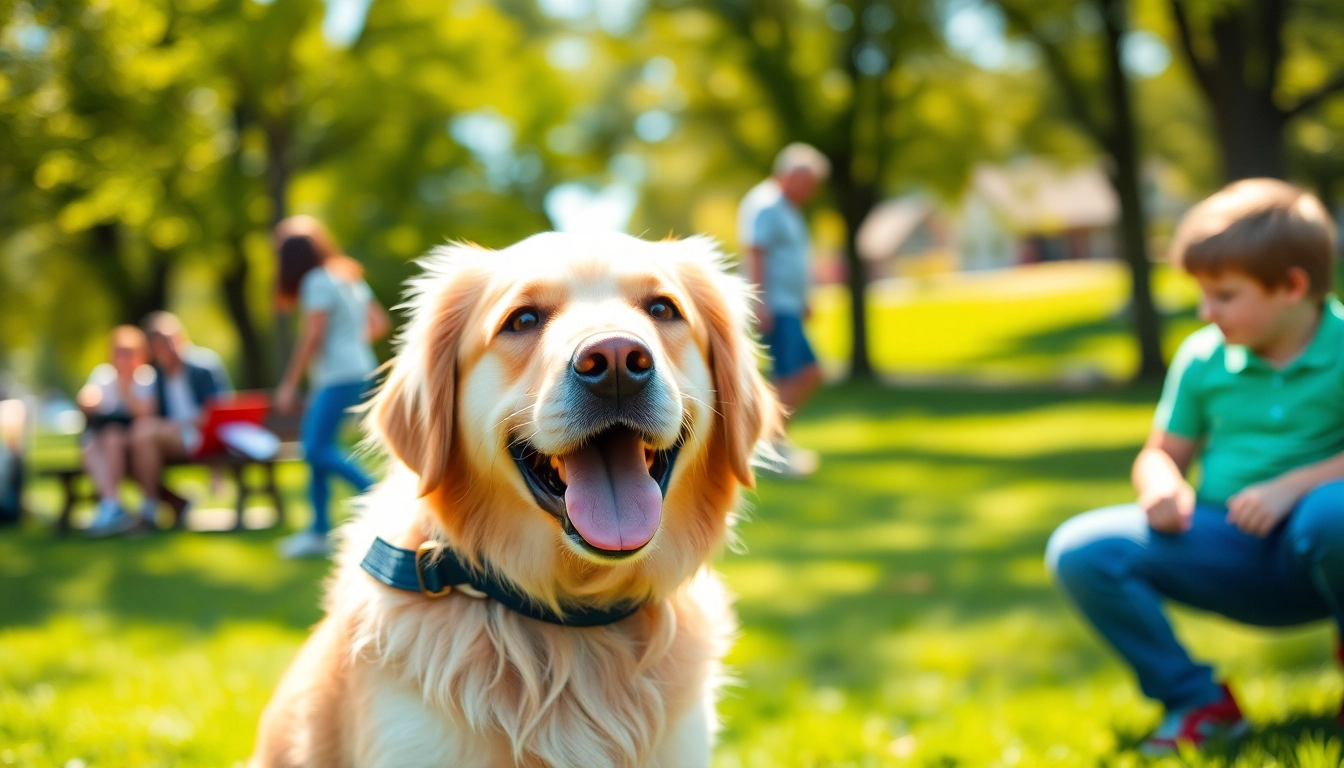Understanding Service Dogs
What Are Service Dogs?
Service dogs are specially trained canines that provide assistance to individuals with disabilities, helping them perform daily tasks and fostering independence. Unlike therapy dogs or emotional support animals, service dogs are trained to perform specific tasks directly related to a person’s disability, such as guiding visually impaired individuals, alerting those with hearing impairments, or assisting individuals with mobility challenges. The Americans with Disabilities Act (ADA) recognizes service dogs as a vital support for people with disabilities, granting them access to public spaces, including restaurants, stores, and public transportation.
Types of Service Dogs
There are various types of service dogs, each trained for specific disabilities. Understanding these types can help prospective owners match with the right service dog:
- Guide Dogs: Trained to assist individuals who are blind or have vision impairments, guide dogs help navigate obstacles and safe pathways.
- Hearing Dogs: These dogs alert their owners to important sounds, such as alarms, doorbells, or crying infants, enhancing awareness for individuals with hearing impairments.
- Mobility Assistance Dogs: Trained to assist individuals with mobility challenges, these dogs can help retrieve objects, open doors, and provide balance support.
- Medical Alert Dogs: Trained to detect medical conditions such as seizures, low blood sugar, or allergic reactions, medical alert dogs can fetch help or alert their owners.
- Psychiatric Service Dogs: These dogs assist individuals with mental health conditions like PTSD or anxiety by providing emotional support and performing specific tasks to mitigate the effects of their disorders.
Benefits of Having a Service Dog
Having a service dog can significantly enhance the quality of life for individuals with disabilities. Some key benefits include:
- Increased Independence: Service dogs enable individuals to perform daily tasks that may be difficult due to their disabilities, fostering a sense of autonomy.
- Enhanced Safety: Service dogs can alert their owners to potential dangers, minimizing risks and enhancing personal safety.
- Emotional Support: Many service dogs offer unconditional companionship, which can greatly improve mental well-being and reduce feelings of isolation.
- Social Interaction: Dog owners often find it easier to connect with others in public spaces, as service dogs can be conversation starters and foster social engagement.
Finding Service Dogs for Sale
Where to Look for Service Dogs for Sale
When searching for service dogs for sale, it is crucial to focus on reputable sources. Here are some avenues to explore:
- Service Dog Organizations: Many organizations specialize in breeding and training service dogs. They often provide listings of dogs available for placement, along with information on their training and suitability for various disabilities.
- Non-Profit Agencies: Various non-profit agencies dedicate their efforts to providing service dogs to individuals in need, often at little to no cost.
- Online Platforms: There are websites and marketplaces dedicated to connecting service dog trainers with potential owners. Make sure to verify the credentials of any listed service dogs before proceeding.
- Local Trainers: Individual trainers and local businesses may also have trained service dogs available for sale or adoption.
Evaluating Service Dogs’ Training and Skills
Not every dog can function effectively as a service dog. Therefore, it’s vital to evaluate the training and skills of each candidate. Consider the following:
- Certification and Training: Look for dogs that have received formal training from accredited organizations or trainers who specialize in service dogs. Most reputable trainers provide documentation of the dog’s training.
- Temperament: Service dogs must possess a calm demeanor, be obedient, and be able to focus despite distractions. Spend time observing how the dog reacts to new people, environments, and sounds.
- Specific Skills: Depending on your needs, the dog may need to perform certain tasks, such as fetching items or alerting you to sounds. Make sure the dog has been specifically trained for your desired tasks.
Pricing and Budget Considerations
The cost of obtaining a service dog can vary widely depending on various factors like breed, training level, and source. Factors to consider include:
- Purchasing vs. Adoption: Some service dogs are available for adoption through non-profit organizations at little or no cost, while others may require significant financial investment due to the amount of training involved.
- Ongoing Expenses: Beyond the initial purchase or adoption fee, budget for veterinary care, food, grooming, and any necessary ongoing training.
- Insurance and Financial Aid: Check with your medical insurance provider to see if any costs related to service dogs can be covered. Some organizations may also offer financial assistance or grants to help offset the costs.
The Adoption Process
Application Requirements
Once you have found a potential service dog, the next step is to apply. Most organizations have specific application requirements, which may include:
- Personal Information: Providing details about your living situation, daily routines, and lifestyle.
- Medical Documentation: Proof of your disability from a qualified healthcare professional may be required.
- Home Visit: Some organizations conduct home visits to ensure a safe environment for the service dog to live in.
Meeting Your Potential Service Dog
After your application is approved, you may have the opportunity to meet potential service dogs. During this meeting, assess the compatibility between the dog and your needs:
- Interaction: Spend time with the dog to see how they respond to you and your needs.
- Behavior: Observe how the dog reacts to various environments, noises, and strangers to ensure they exhibit the temperament suited to being a service dog.
- Training Evaluation: If possible, evaluate the dog’s training to ensure they are able to perform the tasks you will require them to.
Finalizing the Adoption
After determining a suitable match, the final step involves completing the adoption process. This may include:
- Adoption Fee: Payment of any applicable fees associated with the dog’s training and care.
- Contracts: Signing agreements that may outline your responsibilities as a dog owner and possible follow-up training sessions.
- Health Records: Ensure you receive the dog’s health records, including vaccinations and any necessary medications.
Training Your Service Dog
Understanding Training Needs
Even after adoption, there is often a need for continuing training. Understanding the specific needs of both the dog and the owner is crucial in ensuring the partnership flourishes:
- Skills Development: Your service dog may require ongoing training to refine their skills or learn new tasks relevant to your lifestyle.
- Behavioral Reinforcement: Consistency in commands and rewards can help maintain desired behaviors.
- Socialization: Exposing your dog to different environments, people, and situations can help them adapt to real-world challenges.
Professional Training Resources
It might be beneficial to consult with professional trainers who specialize in service dog training. Consider the following options:
- Group Classes: Many trainers offer group classes where service dogs can interact with one another, which is valuable for socialization.
- Private Lessons: For personalized attention, private training may focus on specific tasks or behavioral concerns.
- Online Resources: Numerous online platforms offer training videos and courses tailored for service dog training.
Handling Common Training Challenges
While training is essential, challenges may arise. Being prepared can help you navigate them effectively:
- Distractions: If your dog is easily distracted, practice training in various environments gradually increasing noise levels and distractions.
- Fear or Anxiety: Build your dog’s confidence with positive reinforcement and gradual exposure to new situations.
- Commitment to Consistency: Regular practice is key; setting aside time each day for training can yield significant improvements.
Success Stories from Service Dog Owners
Life-Changing Experiences
Service dogs have transformed lives, providing essential support and empowering their owners. Heartwarming stories often emphasize the profound impact these companions can have. From aiding individuals with PTSD in reclaiming their lives to assisting those with mobility issues regain independence, the bond formed between owner and dog can be transformative.
Community Support and Resources
Being part of a community can greatly enhance the experience of owning a service dog. Engage with local or online support groups for:
- Information Sharing: Exchange tips, training advice, and personal experiences with others.
- Emotional Support: Connect with individuals who understand the unique challenges of owning a service dog.
- Events and Meet-Ups: Participate in community events where service dog owners gather, fostering camaraderie and mutual support.
Tips for New Service Dog Owners
For those who are new to the world of service dogs, consider the following tips to ensure a successful partnership:
- Patience is Key: Transitioning to life with a service dog can take time. Be patient as both you and your dog adjust.
- Stay Educated: Continue learning about service dog training, care, and your legal rights. Regularly revisit training protocols to help your dog thrive.
- Regular Vet Checkups: Maintain your dog’s health with periodic veterinary visits and vaccinations, ensuring a long and healthy partnership.
- Enjoy the Journey: Embrace the dynamic relationship developing between you and your service dog, cherishing the moments of growth and companionship.



